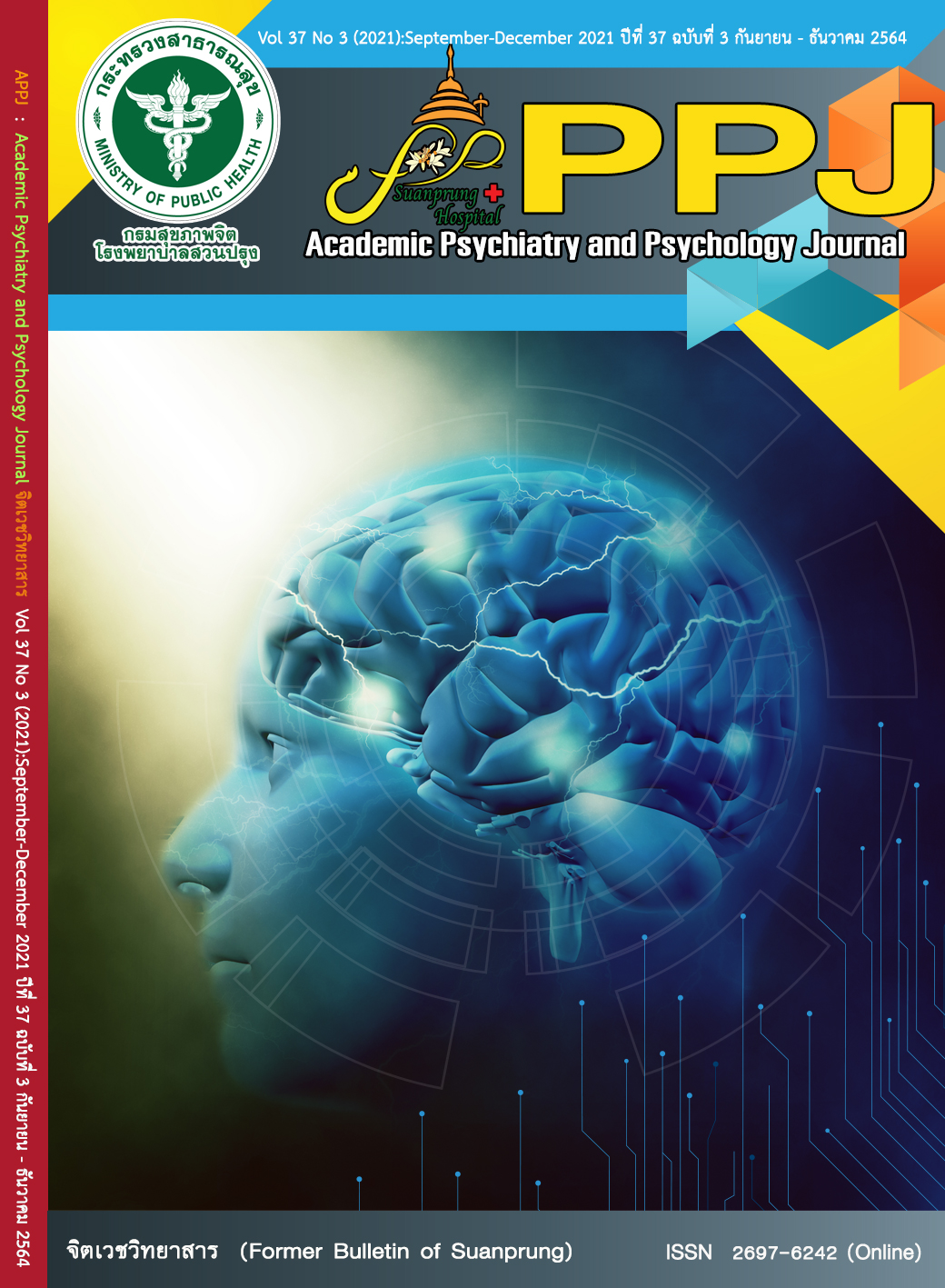Model of Development of Mental Health Care System for Chiang Mai University Students
Main Article Content
Abstract
Objectives: To develop an effective mental health care system for university students, taking into account the needs of clients and health care providers.
Methods: The action research study based on the concept of Kemmis and McTaggart was applied. It consisted of a four-step method: planning stage, acting stage, observing stage and reflection stage. This research was conducted at Chiang Mai University from January to December 2020. The sample group of 55 participants consisted of 8 participants who are administrators with multidisciplinary team, 39 student development affairs staffs from all faculties, and 8 undergraduate students who had visited the psychiatry outpatient department. Research instruments included SWOT analysis, the training, and the structured questionnaire for the focus group and in-depth interview. Content analysis was used for the qualitative data, while descriptive statistics were used for the quantitative data.
Results: The model for developing a mental health care system for university students was developed through action research with the participation of clients and health care providers. The development of mental health care system should include:a guideline for strengthening the relationships with students to promote collaboration, counselling, referral according to the severity of the symptoms, and coordinating with parents. The problems found in this study Include loss of follow-up due to discontinuation of treatment, a teaching system that does not facilitate the student to receive the services, staff’s workload, hospital service system, and a lack of awareness of the illness in the students themselves.
Conclusion: The participatory method leads to an effective and feasible mental health care system development. This system can provide mental health care for students with efficiency and continuity. In addition, it may help reduce the severity of the mental disorders.
Article Details
บทความหลังผ่านการปรับแก้จากกองบรรณาธิการแล้ว เป็นลิขสิทธ์ของวารสารจิตเวชวิทยาสาร โรงพยาบาลสวนปรุง กรมสุขภาพจิต กระทรวงสาธารณสุข ห้ามเผยแพร่เพื่อประโยชน์ทางการค้าโดยไม่ได้รับอนุญาต แต่อนุญาตให้เผยแพร่บทความดังกล่าวเพื่อประโยชน์ทางการศึกษาแก่ประชาชนทั่วไป ทั้งนี้กองบรรณาธิการไม่จำเป็นต้องเห็นด้วยกับบทความหรือข้อคิดเห็นใดๆ ที่ปรากฏในวารสารสวนปรุง
References
Sattayatham C, Chansuk P, Charoensuk S. The psychiatric nursing and mental health. Bangkok: Thana; 2014. (in Thai)
Reangsing C, Wongsuraprakit S. Mental health relates factors to the learning behaviors among First year students at Mae Fah Luang University. Nursing J 2014; 41:122-32. (in Thai)
Bundasak T, Chaowiang K, Jangasem N. Happily learning among nursing students. J MCU Peace Studies. 2017;5:357-69.
Taephant N, Visessuvanapoom P, Pityaratsatian N, Jungsirakulwit D. Understanding depression in adolescents [Internet]. 2019 [cited 2020 Feb 11]. Available from: https:// www.chula.ac.th/cuinside/17693 (in Thai)
Prateepteranun W. Rate of suicide and factors related to suicidal behaviors of the Chaophrayayommarat Hospital in Suphanburi Province. JPNMH 2014;28:90-103. (in Thai)
Medical Record Unit of Maharat Nakhon Chiang Mai Hospital. Statistics of psychiatric out patients department. Chiang Mai: Faculty of Medicine, Chiang Mai University; 2018. (in Thai)
Petpornprapas E. Depression: prevalence and associated factors of suicidal attempts at Bangplee Hospital, Samutprakarn Province. J Psychiatr Assoc Thailand 2020;65 :167-78. (in Thai)
Office of the National Economics and Social Development Council. National strategy 2018-2037 [Internet]. 2018 [cited 2020 Feb 11]. Available from: https://sto.go.th/en/about/policy/20-year-strategic-plan
Supakoon K. Nursing care for patients with stress. JPNMH 2012;26:1-14. (in Thai)
Muijeen K. The effect of psycho-education program on the depressive symptoms among nursing students at Thammasat University. Songklanagarind J Nurs 2017;37:48-59. (in Thai)
Montagni I, Donisi V, Tedeschi F, Parizot I, Motrico E, Horgan A. Internet use for mental health information and support among Eupean university student: The e-MentH project. Digit Health 2016;2:1-16. doi: 10.1177/2055207616653845.
Lohtrakul M. Uncooperative patient [Internet]. 2011 [cited 2021 Nov 21]. Available from: http://www.ramamental.com/generaldoctor/uncoop_patient/
Overbeck G, Davidsen AS, Kousgaard MB. Enablers and barriers to implementing collaborative care for anxiety and depression: a systematic qualitative review. Implement Sci 2016;11:165. doi: 10.1186/s13012-016-0519-y
Editorial Department. CMU healthy university. Tong Kwao Journal 2019;20. (in Thai)
Boonyatisatan E. Professional SWOT analysis manual. 2nd ed. Bangkok: Panyachon; 2010. (in Thai)
Kemmis S, McTaggart R. Participatory action research. In: Denzin NK, Lincoln YS, editors. Handbook of qualitative research. 2ed ed. Sage: Thousand Oaks CA; 2000. p.567-606.
Meuangkhwa P, Chaniang S, Klongdee K. Depression among Thai undergraduate students: The Critical Role of Higher Educational Institutions. JNSU 2020;21:104-16. (in Thai)
Laongsri S, Srichaikul B, Pimchan N. The development of care model for psychiatric patients in the community Tambon Phai, Rattanaburi District, Surin Province. JBCNM 2017;23:68-79. (in Thai)
Pongpipat S, Yantaragorn P, Pukkama P. Health behavior of students in Chiang Mai University. CMU J Edu 2017;1:34-45. (in Thai)
Sathirapanya C, Hempan W. Stress among students in university. Journal of Liberal Arts, Maejo University. 2013;1:42-58. (in Thai)
Suwapanich A. What is knowledge management? [Internet]. 2017 [cited 2021 Nov 26]. Available from: https://erp.mju.ac.th/acticleDetail.aspx?qid=669. (in Thai)
World Health Organization. Preventing suicide: a global imperative. Switzerland: WHO; 2014.
Bureau of Sanatorium and Art of Healing. Professional standards for the art of healing in clinical psychology. Bangkok: Art qualified; 2014. (in Thai)
Chaichumkhun J. Mental health in university [Internet]. 2021 [cited 2020 Nov 21]. Available from: https://thematter.co/social/interview-mental-health-in-uni/134689

